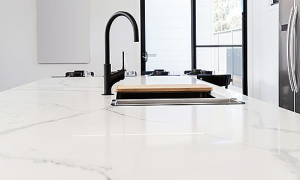Exploring the Differences in Countertop Thickness
Choosing the right thickness for your kitchen countertops is crucial, as it impacts both aesthetics and functionality. The debate between 2cm and 3cm thick countertops revolves around several factors, including durability, installation considerations, and design flexibility. Here’s a closer look at each option to help you determine the best fit for your kitchen.
Weight and Installation
Ease of Handling
2cm countertops, measuring approximately 0.79 inches thick, are lighter, making them easier to handle and install. This can lead to lower labor costs during installation. However, their reduced thickness often necessitates additional support structures like plywood underlayment, which can add to the overall cost and complexity of the installation process.
Durability and Support
In contrast, 3cm countertops, at about 1.18 inches thick, offer greater sturdiness and durability without the need for extra support. This thickness provides better resistance to breakage and stress, making it suitable for heavy-use areas like kitchen islands and bars.
Cost Considerations
Material and Fabrication Costs
While 2cm slabs are generally less expensive per square foot due to using less material, the need for additional supports can offset this initial saving. On the other hand, 3cm slabs, though pricier per square foot, typically involve simpler installation with fewer additional costs, which might make them more cost-effective in the long run.
Aesthetics and Design Flexibility
Edge Profiles and Visual Impact
3cm countertops allow for a broader array of edge profiles, which can enhance the countertop's design and overall kitchen aesthetics. Thicker edges offer a more pronounced, luxurious appearance, often desired in high-end kitchen designs. Meanwhile, 2cm countertops tend to support only simpler edge profiles, aligning well with modern, minimalist styles that favor clean lines and less visual heft.

Matching Your Kitchen’s Style
The choice between 2cm and 3cm can also depend on the style and scale of your kitchen. A thicker countertop might look more in place in a spacious, grand kitchen, whereas a thinner countertop could suit a compact, sleek kitchen better.
Considerations for Longevity
Resistance to Wear and Tear
Thicker countertops inherently possess a higher tolerance to daily wear, impacts, and abrasions. The extra material in 3cm countertops provides a buffer that can help the surface maintain its integrity over time.
Making Your Decision
In conclusion, both 2cm and 3cm countertops have their merits, depending on your specific needs and kitchen layout. Evaluate the expected level of use, desired aesthetic, budget constraints, and long-term durability when making your choice.
Explore More
For further information and to get a more detailed comparison, visit 2cm vs 3cm. This link offers valuable insights into the strengths and weaknesses of each option, helping you make the most informed decision for your kitchen renovation.